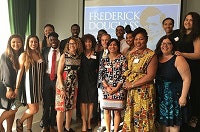The Center for Minority Serving Institutions, in partnership with the Council on International Educational Exchange, has published a report highlighting challenges that dissuade students at minority serving institutions from studying abroad, including cost, culture, and curriculum.
The report, titled “Diversifying Study Abroad and Expanding Equity for Minority Serving Institutions,” highlights the Frederick Douglass Global Fellowship, an initiative created by CMSI and CIEE that covers the costs for 10 MSI students — chosen for their academic achievement, communication skills, and service to others — to participate in an intensive four-week study abroad program focused on intercultural communication and leadership. 
“By outlining the obstacles that can stand in the way of study abroad, and highlighting a program designed to minimize the impact of those obstacles, we hope this report will encourage additional efforts to make study abroad more accessible for under-resourced students, especially those at MSIs,” said Daniel Blake, lead author of the report and research associate at CMSI.
According to the report, though 10.9 percent of all U.S. study abroad students in the 2016-2017 academic year came from MSIs, MSIs enroll over 25 percent of all college students. According to the report, Hispanic Serving Institutions contribute the most to the overall representation of MSI students abroad followed by Asian American Native American Pacific Islander Serving Institutions.
The report also includes information on the fields of study that MSI study abroad students derive from, their destinations, and the duration of their study abroad experiences. The report also includes information on the fields of study that MSI study abroad students derive from, their destinations, and the duration of their study abroad experiences.





















